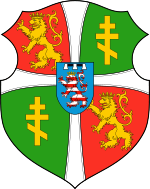House of Battenberg

Arms of the House of Battenberg
|
|

Arms of the Bulgarian branch of the House of Battenberg (formerly ruled Bulgaria)
|
|
| Place of origin | Germany |
|---|---|
| Members | Princess Julia of Battenberg, Princess Marie of Battenberg, Prince Louis of Battenberg |
| Connected members | Princess Alice of Battenberg, Princess Louise of Battenberg, Prince George of Battenberg |
| Connected families | House of Hesse |
The Battenberg family was formally a morganatic branch of the House of Hesse-Darmstadt, rulers of the Grand Duchy of Hesse in Germany. The first member was Julia Hauke, whose brother-in-law Grand Duke Louis III of Hesse created her Countess of Battenberg with the style Illustrious Highness (H. Ill.H.) in 1851, at her morganatic marriage to Grand Duke Louis' brother Prince Alexander of Hesse and by Rhine, and elevated her title to Princess of Battenberg with the style Serene Highness (HSH) in 1858. The name "Battenberg" was last used by her youngest son, Prince Francis Joseph of Battenberg, who died childless in 1924. Most members of the family, residing in the United Kingdom, had renounced their German titles in 1917, due to rising anti-German sentiment among the British public during World War I, and changed their name to "Mountbatten", an anglicised version of Battenberg. The name Battenberg refers to the town Battenberg, Hesse.
Prince Alexander (1823–1888) was the third son of Grand Duke Louis II of Hesse and by Rhine and of Wilhelmina of Baden, yet it was openly rumoured his biological father was actually Baron Augustus de Senarclens, his mother's chamberlain. His spouse, Julia Hauke (1825–1895), was a mere countess – the orphaned daughter of John Maurice von Hauke, a Polish nobleman who had been a general in the Russian army and then Deputy Minister of War of Congress Poland – and therefore of insufficient rank for her children to qualify for the succession to the throne of the Grand Duchy of Hesse. For this reason, her brother-in-law Grand Duke Louis III created the title of Countess of Battenberg (German: Gräfin von Battenberg) for her and for the couple's descendants (a previous family of counts of Battenberg had become extinct in the 14th century). In 1858, the title, which referred to the town of Battenberg, Hesse, was elevated to princely status. There was never a corresponding Principality of Battenberg; the title was a non-sovereign one in the nobility of the Grand Duchy of Hesse.
...
Wikipedia
